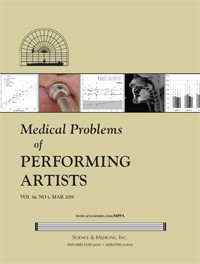 Dr Katie Zhukov from the UQ School of Music has released a journal article that reviews the strategies used in current literature to overcome and combat performance axiety in musicians.
Dr Katie Zhukov from the UQ School of Music has released a journal article that reviews the strategies used in current literature to overcome and combat performance axiety in musicians.
Music performance anxiety (MPA) is a complex area with many individual factors contributing to the level of anxiety experienced by musicians during live performances. This paper provides an overview of research literature on performance anxiety, intended for music teachers, students, and professional musicians, to highlight strategies that have been suggested to manage the accompanying physical and cognitive symptoms.
Treatment of MPA includes mindfulness-based approaches, physiological/ physically-based therapies, cognitive/behavioural therapies, prescribed medication, music therapy, and psychotherapy. The most popular approaches for managing the physical symptoms are relaxation techniques, in particular, deep breathing exercises, yoga, and meditation. Other strategies include Alexander technique, bio- and neuro-feedback, healthy lifestyle, and prescription drugs. Self-handicapping and perfectionism are some of the examples of negative behaviours in musicians.
"Management of cognitive symptoms of MPA includes cognitive restructuring, realistic goal-setting, systematic desensitisation, music therapy, and/or psychotherapy" explains Dr Zhukov. "Combining behavioural techniques with cognitive therapy strategies appears to be the most promising approach among interventions aimed at reducing MPA and improving the quality of music performance".
Cautious interpretation of the efficacy of interventions is needed due to methodological weaknesses of some research, and this overview of current approaches is intended to facilitate understanding for those less familiar with this topic.
Zhukov, K. (2019). Current approaches for management of music performance anxiety: An introductory overview. Medical Problems of Performing Artists, 34(1), 53–60. https://doi.org/10.21091/mppa.2019.1008


